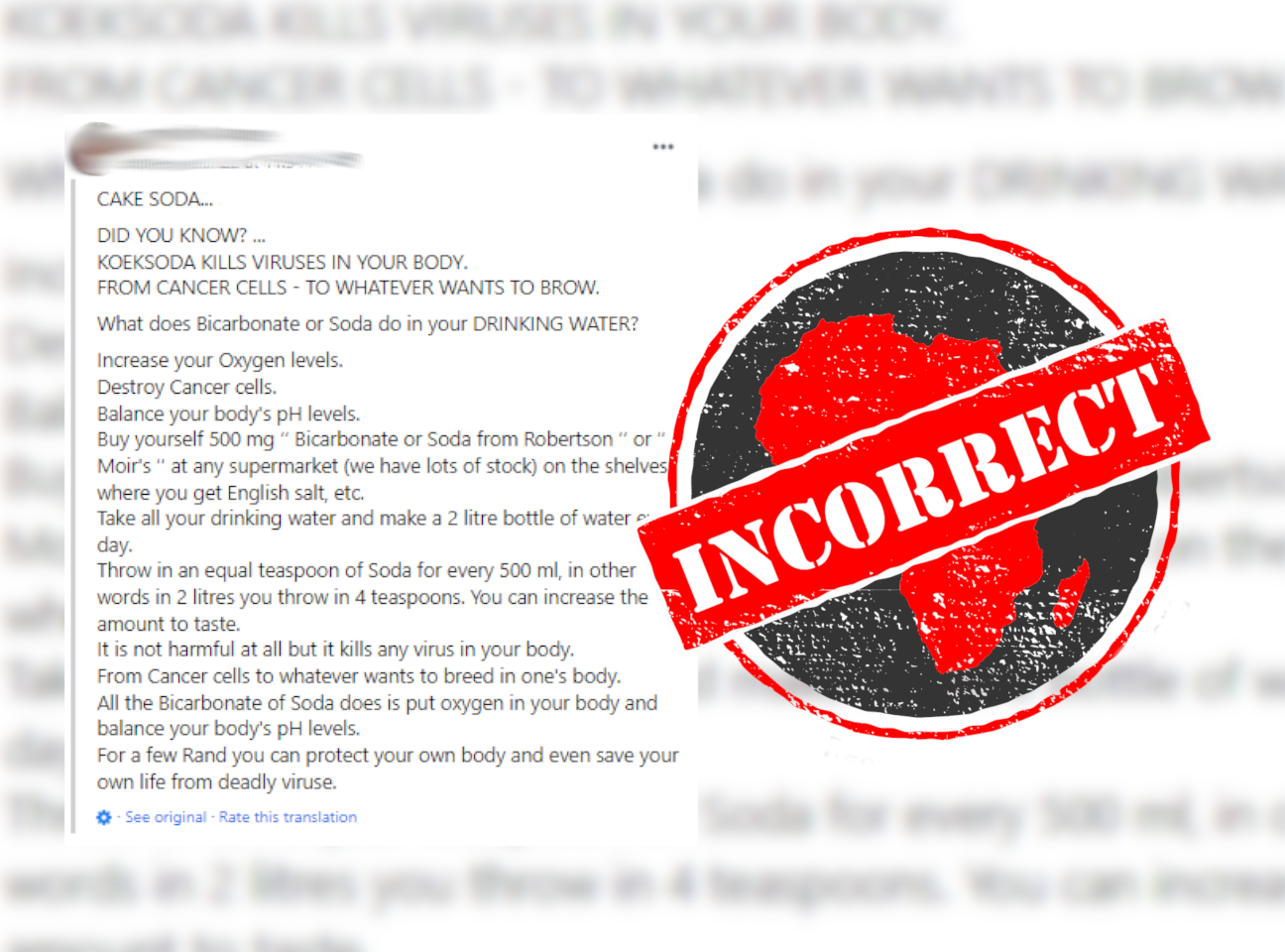“HET JY GEWEET? … KOEKSODA MAAK VIRUSE IN JOU LIGGAAM DOOD. VAN KANKER SELLE - TOT WAT OOK AL WIL BROEI.”
That’s the claim in an Afrikaans message posted on Facebook. It translates as: “Did you know? Baking soda kills viruses in your body. From cancer cells – to whatever else will breed.”
Baking soda, or bicarbonate of soda, is an alkali used to make baked goods rise.
The message says to add one teaspoon of baking soda, or more to taste, to every 500 millilitres of water you drink.
“Al wat die Bicarbonate of Soda doen is plaas suurstof in jou liggaam en balanseer jou liggaam se pH levels,” it continues. This means: “All bicarbonate of soda does is put oxygen in your body and balance your body's pH levels.”
It adds that for only a few rands you can protect your body and save your life from deadly viruses. The rand is South Africa’s currency.
Is this true? Will drinking baking soda mixed into water kill viruses and cancer cells?

‘Baloney’ – virologist
“That one certainly is baloney,” said Prof Diana Hardie, a clinical virologist and head of the diagnostic virology laboratory at South Africa’s Groote Schuur Hospital.
“While oxygen is essential to keep us alive, it does not specifically kill viruses.” And the only thing that “puts oxygen in your body is the lungs”, she told us – not baking soda.
“Viruses are eliminated from the body by the immune system of the infected person,” Hardie said.
“Once an immune response has been generated, infected cells and virus particles are cleared by T lymphocytes and specific antibodies respectively.” Vaccines can stimulate an immune system response.
Although “there are a few antiviral drugs that specifically block virus replication” such as antiretroviral drugs used for the treatment of HIV, this is mostly left up to the immune system.
‘Rubbish’ – cancer specialist
“That's absolutely rubbish,” said Prof Janet Poole, head of the paediatric haematology and oncology unit at Charlotte Maxeke Academic Hospital in Johannesburg. Oncology is the study of cancer.
“Once you have a cancer cell you can’t kill it with anything else besides proper treatment,” she told us. This includes chemotherapy, radiation, immunotherapy or “whatever the treatment is for whatever cancer cell it is”.
Cancer includes many diseases in which abnormal cells grow in the body, often spreading and destroying normal body tissue.
Although viruses sometimes cause cancer, they are not the only cause. The disease has many possible causes.
The Mayo Clinic, a US-based nonprofit, says that to reduce the risk of cancer, you should not smoke, avoid excessive sun exposure, eat healthily, exercise regularly, drink alcohol in moderation, and see a doctor about cancer screening and necessary immunisations.
Africa Check has previously debunked an old myth that cancer is caused by “unbalanced” pH levels in the body.
Republish our content for free
For publishers: what to do if your post is rated false
A fact-checker has rated your Facebook or Instagram post as “false”, “altered”, “partly false” or “missing context”. This could have serious consequences. What do you do?
Click on our guide for the steps you should follow.
Publishers guideAfrica Check teams up with Facebook
Africa Check is a partner in Meta's third-party fact-checking programme to help stop the spread of false information on social media.
The content we rate as “false” will be downgraded on Facebook and Instagram. This means fewer people will see it.
You can also help identify false information on Facebook. This guide explains how.


Add new comment